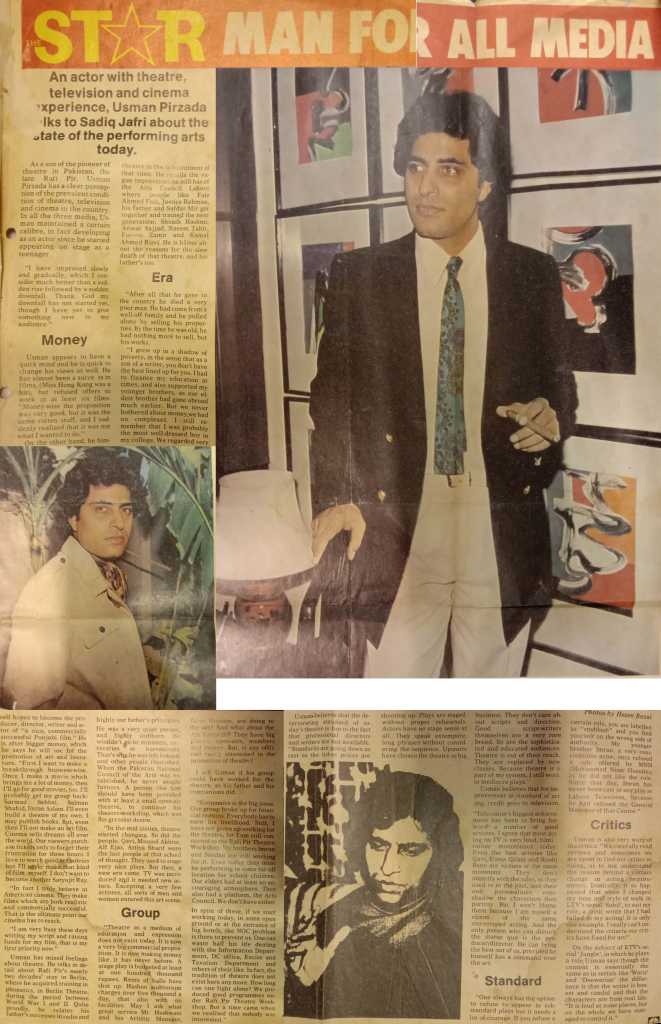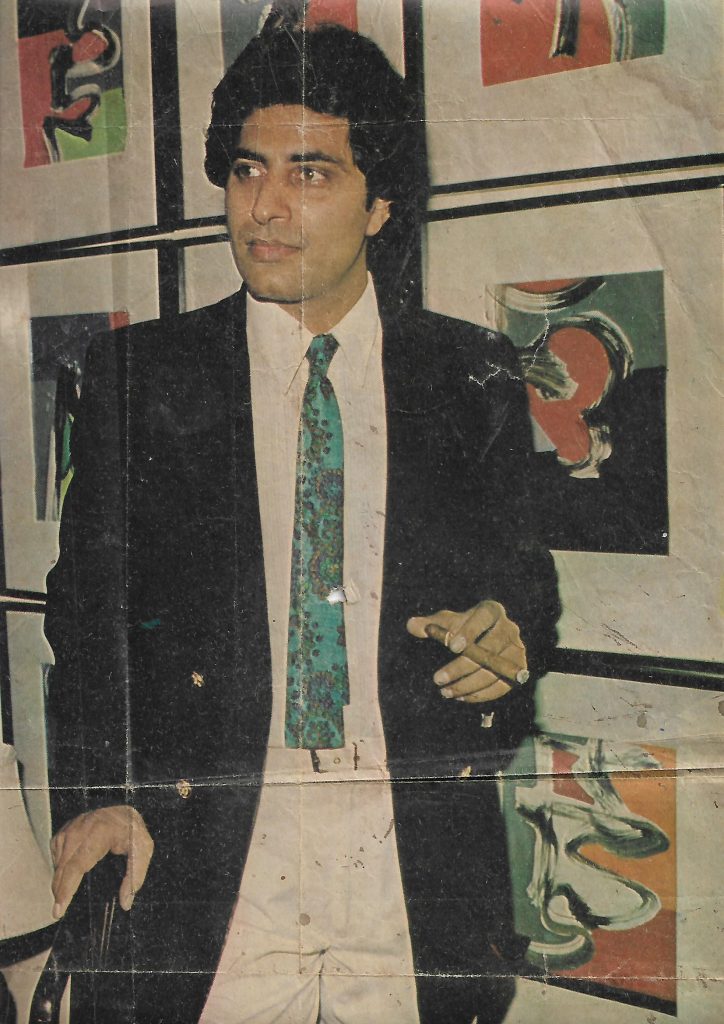The Star
Oct. 25, 1984
―Usman Pirzada
An actor with theatre, television and cinema experience, Usman Pirzada talks to Sadiq Jafri about the state of the performing arts today.
As a son of the pioneer of theatre in Pakistan, the late Rafi Pir, Usman Pirzada has a clear perception of the prevalent condition of theatre, television and cinema in the country. In all the three media, Usman maintained a certain caliber, in fact developing as an actor since he started appearing on stage as a teenager.
“I have improved slowly and gradually, which I consider much better than a sudden rise followed by a sudden downfall. Thank God my downfall has not started yet, though I have yet to give something new to my audience.”
Money
Usman appears to have a quick mind and he is quick to change his views as well. He has almost been a success in films, (Miss Hong Kong was a hit), but refused offers to work in at least six films.

“Moneywise the proposition was very good, but it was the same rotten stuff, and I suddenly realized that it was not what I wanted to do.”
On the other hand, he himself hopes to become the producer, director, writer and actor of “a nice, commercially successful Punjabi film.” He is after bigger money, which he says he will use for the promotion of art and literature. “First I want to make a breakthrough business-wise. Once I make a movie which brings me a lot of money, then I’ll go for good movies, too. I’ll probably get my group back: Sarmad Sehbai Salman Shahid, Imran Aslam. I’ll even build a theatre of my own. I may publish books. But even then, I’ll not make an art film. Cinema sells dreams all over the world. Our viewers purchase tickets only to forget their frustration for three hours. I love to watch good art movies but I’ll never make that kind of film myself. I don’t want to become another Satyajit Ray.
“In fact, I truly believe in American cinema. They make films which are both realistic and commercially successful. That is the ultimate point our cinema has to reach.
“I am very busy these days writing my script and raising funds for my film, that is my first priority now.”
Usman has mixed feelings about theatre. He talks in detail about Rafi Pir’s nearly two decades’ stay in Berlin, where he acquired training in phonetics, in Berlin Theatre, during the period between World War I and II. Quite proudly, he relates his father’s successes in radio and theatre in the subcontinent of that time. He recalls the vague impressions he still has of the Arts Council Lahore where people like Faiz Ahmed Fair, Justice Rehman his father and Safdar Mir got together and trained the next generation: Shoaib Hashmi, Anwar Sajjad, Naeem Tahir, Farooq Zamir and Kamal Ahmed Rizvi. He is bitter about the reasons for the slow death of that theatre, and his father’s too.
Era
“After all that he gave to the country he died a very poor man. He had come from a well-off family and he pulled alone by selling his properties. By the time he was old, he had nothing more to sell, but his works.”
“I grew up in a shadow of poverty, in the sense that as a son of a writer, you don’t have the best lined up for you. I had to finance my education at times, and also supported my younger brothers, as our eldest brother had gone abroad much earlier. But we never bothered about money, we had no complexes. I still remember that I was probably the most well-dressed boy in my college. We regarded very highly our father’s principles.

He was a very quiet person, and highly stubborn. He wouldn’t go to ministers, secretaries or bureaucrats. That’s why he was left behind, and other people flourished. When the Pakistan National Council of the Arts was established, he never sought favors. A person like him should have been provided with at least a small open-air theatre, to continue his theatre workshop, which was his greatest desire.
“In the mid-sixties, theatre started changing. So did the people. Qavi, Masood Akhtar, Ali Ejaz, Attiya Sharif were the last people of that school of thought. They used to stage very nice plays. But then, a new era came. TV was introduced and it needed new actors. Excepting a very few artistes, all sorts of men and women entered this art scene.”
Group
“Theatre as a medium of education and expression does not exist today. It is now a very big commercial proposition. It is now making money like it has never before. A stage play is budgeted at least at one hundred thousand rupees. Rents of halls have shot up. Hashoo auditorium charges over five thousand a day, that also with no facilities. May I ask what great service Mr. Hashwani and his Artistic Manager, Talat Hussain, are doing to the art? And what about the Art Councils? They have big places, open-airs, members and money. But, is any official really interested in the promotion of theatre?
I ask Usman if his group could have worked for the theatre, as his father and his companions did.
“Economics is the big issue. Our group broke up for financial reasons. Everybody has to earn his livelihood. Still, I have not given up working for the theatre, for I am still connected to the Rafi Pir Theatre Workshop. My brothers Imran and Saadan are still working for it. Even today they must be performing in some far-off location for school children. Our elders had at least an encouraging atmosphere. They also had a platform, the Arts Council. We don’t have either.

In spite of these, if we start working today, in some open ground or at the entrance of big hotels, the NOC problem is there to prevent us. One can waste half his life dealing with the Information Department, DC office, Excise and Taxation Department and others of their like. In fact, the tradition of theatre does not exist here anymore. How long can one fight alone? We produced good programs under Rafi Pir Theatre Workshop. But a time came when we realized that nobody was interested.”
Usman believes that the deteriorating standard of today’s theatre is due to the fact that professional directors and writers are not available “Standards are going down as fast as the ticket prices are shooting up. Plays are staged without proper rehearsals. Actors have no stage sense at all. They speak extempore, long phrases without considering the sequence. Upstarts have chosen the theatre as big business. They don’t care about scripts and direction. Good scriptwriters themselves are a very rare breed. So are the sophisticated and educated audiences. Theatre is out of their reach. They are replaced by new classes. Because theatre is a part of my system, I still work in mediocre plays.
Usman believes that for improvement in standard of acting, credit goes to television. “Television’s biggest achievement has been to bring forward a number of good artistes. I agree that most acting on TV is very loud, filmi rather monotonous today. Even the best artistes like Qavi, Uzma Gilani and Roohi Bano are victims of the same monotony. They don’t identify with the roles, as they used to in the past, and their own personalities over shadow the characters they portray. But I won’t blame them because I am myself a victim of the same stereotyped acting. And the only person who can disturb the status quo is the producer/director. He can bring the best out of us, provided he himself has a command over the art.
Standard
“One always has the option to refuse to appear in substandard plays but it needs a lot of courage. If you refuse a certain role, you are labeled as “snobbish and you find yourself on the wrong side of authority. My younger brother Imran, a very conscientious actor, once refused a role offered by MNH (Mohammad Nisar Hussain), as he did not like the role. Since that day, Imran has never been cast in any play at Lahore Television, because he had refused the General Manager of that Centre.”
Critics
Usman is also very wary of the critics. “We carefully read reviews and sometimes we are upset to find our critics so naive, as to not understand the reason behind a certain change in acting requirements. Ironically, it so happened that when I changed my tone and style of walk-in LTV’s serial ‘Sahil’, to suit my role, a critic wrote that I had failed in my acting! It is only one example. I really can’t understand the criteria our critics have fixed for art!”

On the subject of KTV’s serial ‘Jungle’, in which he plays a role, Usman says though the content is essentially the same as in serials like ‘Waris and ‘Deewarian’ the difference is that the writer is honest and candid and that the characters are from real life. “It is loud at some places, but on the whole, we have managed to control it.”